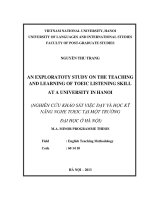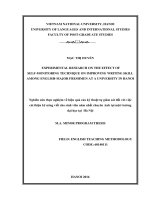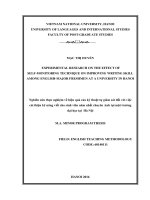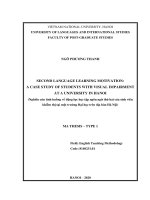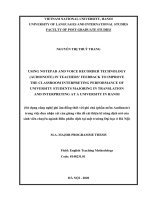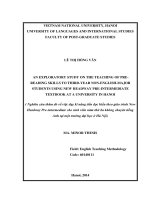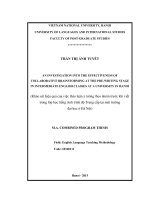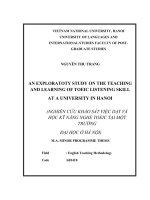Experimental Research on the Effect of Self-monitoring Technique on Improving Writing Skill among English-major Freshmen at a University in Hanoi
Bạn đang xem bản rút gọn của tài liệu. Xem và tải ngay bản đầy đủ của tài liệu tại đây (212.69 KB, 11 trang )
VIETNAM NATIONAL UNIVERSITY, HANOI
UNIVERSITY OF LANGUAGES AND INTERNATIONAL STUDIES
FACULTY OF POST-GRADUATE STUDIES
----------
MẠC THỊ HUYỀN
EXPERIMENTAL RESEARCH ON THE EFFECT OF
SELF-MONITORING TECHNIQUE ON IMPROVING WRITING SKILL
AMONG ENGLISH-MAJOR FRESHMEN AT A UNIVERSITY IN HANOI
Nghiên cứu thực nghiệm về hiệu quả của kỹ thuật tự giám sát đối với việc
cải thiện kỹ năng viết cho sinh viên năm nhất chuyên Anh tại một trường
đại học tại Hà Nội
M.A. MINOR PROGRAM THESIS
FIELD: ENGLISH TEACHING METHODOLOGY
CODE: 60140111
HANOI 2016
VIETNAM NATIONAL UNIVERSITY, HANOI
UNIVERSITY OF LANGUAGES AND INTERNATIONAL STUDIES
FACULTY OF POST-GRADUATE STUDIES
----------
MẠC THỊ HUYỀN
EXPERIMENTAL RESEARCH ON THE EFFECT OF
SELF-MONITORING TECHNIQUE ON IMPROVING WRITING SKILL
AMONG ENGLISH-MAJOR FRESHMEN AT A UNIVERSITY IN HANOI
Nghiên cứu thực nghiệm về hiệu quả của kỹ thuật tự giám sát đối với việc
cải thiện kỹ năng viết cho sinh viên năm nhất chuyên Anh tại một trường
đại học tại Hà Nội
M.A MINOR PROGRAM THESIS
FIELD: ENGLISH TEACHING METHODOLOGY
CODE: 60140111
SUPERVISOR: Dr. TRẦN THỊ THU HIỀN
HANOI 2016
DECLARATION
I hereby state that I, Mac Thi Huyen, being a candidate for the degree of Master
of Arts (TEFL) accept the requirements of the university relating to the retention
and use of Master Thesis deposited in the library.
In terms of these conditions, I agree that the origin of my paper deposited in the
library should be accessible for the purposes of study and research, in
accordance with the normal conditions established by the librarian for the care,
loan or reproduction of the paper.
Signature
i
ACKNOWLEDGEMENTS
It is my pleasure to thank those who made this thesis possible.
Firstly, I owe my deepest gratitude to my supervisor, Dr. Tran Thi Thu Hien,
whose encouragement, guidance and support from the initial to the final level
enabled me to develop an understanding of the subject.
Secondly, I would like to thank Ms. Pham Thu Duong and Ms. Le Thi Thu
Thuy, two teachers of English at the research site (English Department, a Hanoibased university) for their invaluable assistance together with professional
advice during the research time.
Thirdly, this thesis would not have been possible without the enthusiastic
participation of 58 English-major freshmen at English Department of the
university where the research was carried out.
Lastly, I offer my regards and blessings to all of those who supported me in any
respect during the completion of the study.
Mac Thi Huyen
ii
iii
PART I: INTRODUCTION
This part is dedicated to introducing the rationale of the study, the problem to be
addressed in the study, the aims and objectives of the study, and the research
questions to be answered. It will also present the scope of the study, an overview
of the employed methods and the design of the study.
1. Rationale
Writing is considered a complicated and multifaceted task. Good writing
involves thinking that may lead the writer to express himself/herself in a more
effective way. For learners of English, writing is a vital skill, one of the main
criteria to measure a learner’s second language proficiency. Unfortunately,
writing is a difficult skill which is not easy to be improved. Therefore, various
approaches to teaching writing have been recommended to help cope with this
problem. Of all, self-monitoring is a technique the effectiveness of which is a
controversial issue among many researchers. As a matter of fact, there exists
some research on self-monitoring in teaching. However, little attention has been
paid to self-monitoring in writing teaching. In Vietnam, self-monitoring remains
a totally new concept which has not been researched in academic papers.
Hopefully, this thesis will help shed light on the effect of self-monitoring in
writing class in the specific context of a university in Vietnam.
The context chosen by the researcher to conduct this research is English
Department of a Hanoi-based university. The participants all are first-year
majors. Of the four language skills taught here, writing is regarded as not only
challenging but also boring by the mainstream first-year major students. The
students encounter numerous difficulties when being asked to produce in-class
texts. It is actually hard for them to produce a high quality text due to such
reasons as language incompetence, lack of motivation and a traditionally passive
way of learning. They tend to ignore writing and pay more attention to the three
other language skills. As a result, the students have fewer opportunities of
success at academic writing when they move to higher levels in the later years
1
despite adequate oral communication skills. This long term consequence is
serious and worth being taken into consideration. How to teach the first year
English-major students to write well is a question posed in the many past years
drawing a lot of attention from the teachers.
With the desire for enhancing the quality of writings produced by major
freshmen as well as developing learners’ autonomy, the researcher decides to
carry out the thesis “Experimental Research on the Effect of Self-Monitoring
Technique on Improving Writing Skill among English-Major Freshmen at a
University in Hanoi” by applying the self-monitoring technique in practice in
two writing classes. This study is hoped to be successful and bring about
feasible applications towards upgrading the learning and teaching writing for
English-major freshmen at this university as well as at other universities.
2. Aims and objectives
The research aims at investigating the effect of self-monitoring technique on
improving writing skill among English-major freshmen at a university in Hanoi.
This fundamental aim can be achieved when the two following objectives are
met. The first objective of the study is to find out the effects of self-monitoring
technique on the students’ writing improvement. Next, the researcher wishes to
explore the students’ attitudes towards self-monitoring technique.
3. Scope of the study
The scope of the research has been made quite clear from the title:
“Experimental research on the effect of self-monitoring technique on improving
writing skill among English-major freshmen at a university in Hanoi.”
Firstly, the research focuses on “self-monitoring technique in writing.” To be
more specific, it refers to the process in which students write notes or
annotations on their writings before handing it to the teacher. This will help
students place themselves in the position of readers, not only writers. As for
teachers, self-monitoring technique gives them an opportunity to offer feedback
2
REFERENCES
(1) Arndt V. (1987), “Six Writers in Search of Texts: A Protocol-based Study of
L1 and L2 Writing”, ELT Journal, 41 (4), pp. 257 – 267.
(2) Benson P. (2001), Teaching and Researching Autonomy in Language
Learning, Pearson Education, England.
(3) Brannon L., Knight M., Neverow-Turk V. (1982), Writers Writing,
Boynton/Cook Publishers, Portsmouth.
(4) Byrne D. (1991), Teaching Writing Skills, Longman, London.
(5) Chen X. (2009), “Self – monitoring feedback in English writing teaching”,
Research in Theoretical Linguistics, 3 (12), pp. 109 – 117.
(6) Charles M. (1990), “Responding to problems in written English using a
student self – monitoring technique”, ELT Journal, 44 (4), pp. 286 – 293.
(7) Cohen L., Manion L., Morrison K. (2007), Research Methods in Education,
Routledge, New York.
(8) Cooper J. O., Heron T. E., Heward W. L. (1987), Applied Behavior Analysis,
Merrill, Columbus.
(9) Cresswell A. (2000), “Self – monitoring in student writing: developing
learner responsibility”, ELT Journal, 54 (3), pp. 235 – 244.
(10) Faerch C., Kasper G. (1983), Kommunikation im (Sprach-) Unterricht,
University of Utrecht, Utrecht.
(11) Faigley L., Witte S. (1981), “Analyzing Revision”, College Composition
and Communication, 32 (4), pp. 400 – 414.
(12) Flower L., Hayes J. R. (1981), “A Cognitive Process Theory of Writing”,
College Composition and Communication, 32 (4), pp. 365 – 387.
(13) Harris J. (1993), Introducing Writing, Penguin English, UK.
(14) Hillocks G. (1987), “Synthesis of Research on Teaching Writing”,
Educational Leadership 5 (87), pp. 71-82.
(15) Hyland F. (2000), “ESL writers and feedback: giving more autonomy to
students”, Language Teaching Research 4 (I), pp. 33 – 54.
I
(16) Kazdin A. E. (1974), “Self-monitoring and Behavior Change”, Selfcontrol: Power to the Person, Brooks/Cole, Monterey.
(17) Kormos J. (1999), “Monitoring and self-repair in L2”, Language Learning,
49, pp. 286 – 293.
(18) Leki I. (1976), Academic Writing, Techniques and Task, ST. Martin’s
Press, New York.
(19) Leki I. (1990), “Feedback in the writing process: a model and method for
implementation”, ELT Journal 44 (4), pp. 294 – 304.
(20) Mace F. C., Belfiore P. J., Hutchison J. M. (2001), “Operant theory and
research on self-regulation”, Self-regulated learning and academic
achievement, pp. 39-65.
(21) Muncie J. (2000), “Using written teacher feedback in EFL composition
classes”, ELT Journal 54 (I), pp. 47 – 53.
(22) Murray D. M. (1978), Internal Revision: A Process Discovery, the National
Council of Teachers of English, Illinois.
(23) Nelson R. O., Hayes S. C. (1981), “Theoretical Explanations for Reactivity
in Self-monitoring”, Behavior Modification, 5, pp. 3 – 14.
(24) Nunan D. (1992), Research Methods in Language Learning, Oxford
University Press, Oxford.
(25) O’Malley J. M., Chamot A. U. (1985), “Learning strategies applications
with students of English as a second language”, TESOL Quarterly, 27, pp.
679 – 689.
(26) Perl S. (1979), “The Composing Process of Unskilled College Writers”,
Research in the Teaching of English, 13, p. 43.
(27) Raimes A. (1993), Techniques in Teaching Writing, Oxford University
Press, Oxford.
(28) Rozakis L. E. (1997), The Complete Idiot’s Guide to Creative Writing,
Alpha Books, UK.
II
(29) Schunk D. H. (1983), “Progress self – monitoring: Effects on children’s
self – efficacy and achievement”, Journal of Experimental Education, 51,
pp. 89 – 93.
(30) Shapiro E. S., Ackerman A., (1983), “Increasing productivity rates in adult
mentally retarded clients: The failure of self – monitoring”, Applied
Research in Mental Retardation, 4, pp. 163 – 181.
(31) Susser S. H. (1981), Self-monitoring success and failure: Evidence for a
mediating mechanism, Paper presented at annual convention of the American
Psychological
Association,
Los
Angeles,
CA.
(ERIC
Document
Reproduction Service No. ED 217348)
(32) Thorensen C. E., Mahoney M. J. (1974), Behavioral Self-Control, New
York.
(33) Tribble C. (1996), Writing, Oxford University Press, Oxford.
(34) Wenden A. (1991), Learner Strategies for Learner Autonomy, London:
Prentice Hall International.
(35) White R. V. (1991), Process Writing, Longman, London.
(36) Xiang W. (2004), “Encouraging self – monitoring in writing by Chinese
students”, ELT Journal 58 (3), pp. 238 – 246.
(37) Zamel V. (1983), “The Composing Processes of Advanced ESL Students:
Six Case Studies”, TESOL Quarterly, 17 (2), pp. 165 – 187.
(38) Zimmerman B. J., Risemberg R. (1997), “Becoming a self – regulated
writer: a social cognitive perspective”, Contemporary Educational
Psychology, 22, pp. 73 – 101.
III
IV
